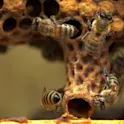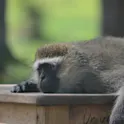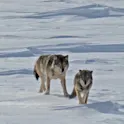Think fast! Clever monkeys plan their food trips to avoid stronger rivals
By Mischa Dijkstra, Frontiers science writer Vervet monkey, Chlorocebus pygerythrus, from K social group in Uganda. Image credit: TJM Arseneau-Robar, KA Anderson, EN Vasey, P Sicotte, JA Teichroeb Researchers show that vervet monkeys take into account complex social contexts to plan their food trips. When higher-ranking competitors are nearby, they rush to secure the best food immediately. But when they have sufficient time, they choose a route that maximizes the total food intake and minimizes travel distance. Vervet monkeys are quick and clever planners of the best route to follow on foraging trips, shows a new study. When dominant group mates are too far away to interfere, vervets tend to choose the shortest route along successive food sites, snacking on each at leisure. But when dominants group mates are nearby, they seem to assess the time before these can approach and displace them at the feeding site. They then choose the route that maximizes their food intake and minimizes travel distance before the competitors’ arrival. These results, published in Frontiers in Ecology and Evolution, mean that vervets have excellent cognitive skills for quickly appraising the social context and planning their route accordingly. These skills allow them to choose foraging strategies […]














